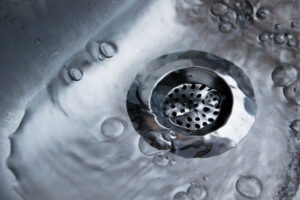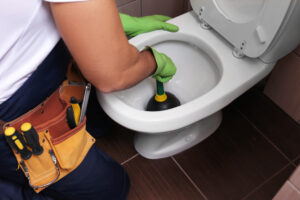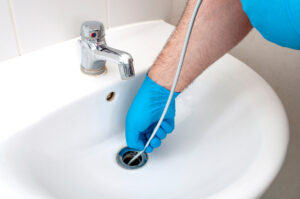Residential drains become clogged for a number of reasons, some of which include aging pipes, debris causing blockages, tree root infiltration, and severe pipe damage. Some residential drain issues can only be inspected and cleaned by an experienced licensed plumber, such as in cases where there is damage to the sewer line. Other residential drain issues like clogged toilets, sinks or bathtubs can – for the most part – be cleaned by the residents themselves.
Residential Drain Cleaning That Requires Professional Plumbers

As the name suggests, chemical drain cleaning uses acrid chemicals to break apart sludge and other debris that are clogging up the sewer main line. Given the intensity of these chemicals, they shouldn’t be used carelessly as they can harm plants and animals. A safer alternative to acrid chemicals is biological cleaners that use proteins and other microorganisms to break down the sludge and debris.
Two other safer alternatives to chemical drain cleaning are hydraulic and mechanical drain cleaning. A hydraulic drain cleaning system works by pressurizing water to make it forceful enough to push out debris and other objects that are blocking drains. Pressurized water is also highly effective at breaking down sludge and unclogging drains that way. Since drain blockages come in many different shapes, sizes, and compositions, different nozzles are needed to unclog drains successfully, which is where having a professional plumber comes in handy. A licensed plumber is better equipped to assess drain clogs and the extent of blockage to determine the best nozzle to use.
Similar to hydraulic drain cleaning is mechanical drain cleaning, which also clears out drains by breaking apart debris that clogs them up and forces out blockages. There are three types of mechanical drain cleaning systems: bucket machines, capsules known as pigs, and rodding. Out of the three, bucket machines are the most effective at cleaning out severe clogs in the sewer main line.
Residential Drain Cleaning Residents Can Do At Home
While cleaning out sewer main lines is a job best left to professional plumbers, there are still some things residents can do to keep their own drains clean and minimize clogging of the main sewer. Many of these methods don’t require purchasing any fancy chemicals and can be accomplished using household items. Some of these include boiling water, using baking soda, salt, and vinegar, dish detergent, pipe cleaners, pressure washing, and wire hangers.
Boiling Water And Dish Detergent

Of course, to achieve the desired effect, it’s important to gradually pour boiling water down the drain and not dump it all in at once. Similarly, only a quarter of dish detergent is needed to lubricate the pipe internally.
Baking Soda In Combination With Salt, Vinegar, And Pressure Washing
Another popular household item that is highly effective at cleaning drains is baking soda. In fact, there’s a lot that can be done with baking soda alone, especially when used in combination with other household items such as salt and vinegar, and even a plunger or a drain snake.
Mixing salt and baking soda with boiling water does wonders for a drain. When mixed in equal proportions, it generates a chemical reaction that removes gunk and unclogs drains. While this method admittedly takes longer than some of the other methods listed on here, the wait is worth it for the results it generates. All that a resident has to do is pour the salt and baking soda into the drain and let it sit for a couple of hours before rinsing it down with boiling water.
A somewhat faster method that still maximizes the dissolving properties of baking soda is to use it in combination with vinegar. While baking soda alone can break apart dirt and grease, vinegar does the extra step of removing hair, grease, and grime. This method is especially ideal for bathtubs where hair gets easily trapped inside the drain, clogging it up. Vinegar is also highly effective at neutralizing acidic odors inside the drain.
For this method to work successfully, a resident will need to pour 1/3 cup each of vinegar and baking soda down the drain and wait an hour before gradually pouring the boiling water. Another variation of the baking soda and vinegar method that is also highly effective at cleaning out drains is using it in combination with pressure washing. This is where having a plunger or a drain snake comes in handy. You still follow the same steps as before, except instead of boiling water, you’re now adding 60 gallons of water and pumping it down with either a plunger or a drain snake. The pressure from the pumping forces debris, sludge, and other gunk to dislodge.
Drain Snakes, Wire Hangers, And Pipe Cleaners

An alternative to the drain snake is a wire hanger, which is readily available at home. All that’s needed is for the wire hanger to be straightened and inserted into the drain, and like the drain snake, can easily dislodge the sludge and other debris that’s blocking the drain. The only thing to be cautious of when using wire hangers for drain cleaning is to not push the blockages further down the drain. Once the sludge has been dislodged, the next step is to pour boiling water down the drain to further break the sludge apart and finish cleaning the pipe.
While there is no shortage of ways to clean drains – either professionally or on your own – good maintenance of residential drains goes a long way to preventing complications from clogs and other blockages that can easily damage the main sewer lines. Even when there is a clog or a blockage, a combination of cleaning the drain immediately and calling a professional plumber to perform a more in-depth inspection will do more to keep sewer main line in good shape in the long term.
